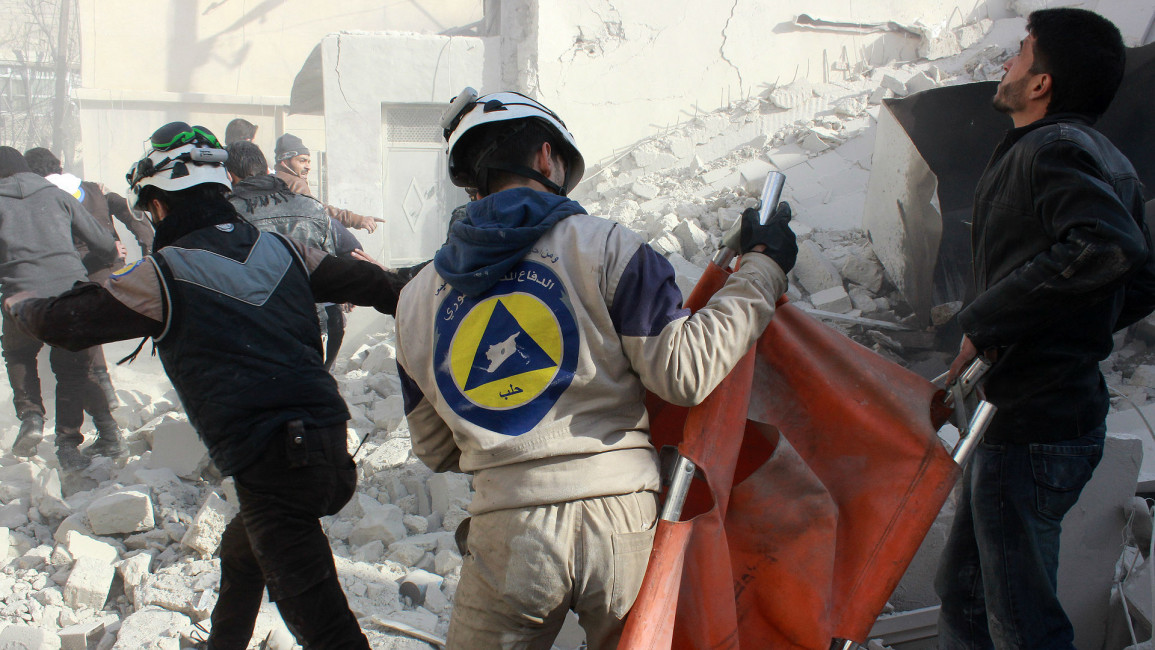Suspected Russian raids 'kill civilians in east Syria'
Suspected Russian raids killed several civilians in eastern Syria on Saturday, amid reports US forces are building up an air base to bolster their fight against militants further north.
Meanwhile, senior diplomats scrambled to resolve the key question of who will represent Syria's opposition at crucial talks next week aimed at ending the nearly-five year war.
In eastern Syria, the 33 civilians were killed in airstrikes suspected to have been carried out by Russian warplanes on a militant-held village.
The Syrian Observatory for Human Rights said nine children and two women were among the dead in Khasham, which is controlled by the Islamic State group (IS).
The village is in Syria's oil-rich Deir Az-Zur province, where IS has sought to advance in recent days despite a barrage of Russian and Syrian government air strikes.
The week-long IS offensive on the provincial capital has left nearly 500 people dead and sparked fears of mass killings among the 200,000 people still living there.
IS declared a self-styled "caliphate" in 2014 across swathes of Syria and Iraq, imposing its ultra-conservative interpretation of Islamic law there.
In Syria, it is under fire by the government and Damascus's long-time ally Russia, as well as a US-led coalition also battling the militants in Iraq.
To bolster their fight against the group, US special forces deployed in Syria are building up an airbase in the northeast, sources told AFP on Saturday.
'US strengthening airfield'
A Syrian military source said nearly 100 "American experts" and Syrian Kurdish militia were nearly done outfitting Rmeilan airfield in Hassakeh province.
"The airbase will be used for helicopters and cargo planes. Its strip is now 2,700 metres (yards) long and is ready to be used by planes that will transport equipment and ammunition," the source added.
A security source in northeast Syria said "American special forces and advisers are using the Rmeilan airport as a base, from where helicopters are taking off towards the fronts".
The Pentagon said the US had "not taken control" of any airfield in Syria.
"There has been no change to the size of mission of the US presence in Syria," said US Central Command spokesman Colonel Pat Ryder.
"That being said, US forces in Syria are consistently looking at ways to increase efficiency for logistics and personnel recovery support," he said.
In October, Washington authorised the deployment to Syria of up to 50 special operations troops to advise local forces battling IS.
Syria's conflict first erupted with anti-government protests in 2011 but has since morphed into a bloody, complicated war that has killed more than 260,000 people.
Previous diplomatic efforts to end the hostilities have faltered, but world powers are putting their weight behind a new round of talks set to begin next week.
Controversy over opposition
Representatives from Syria's government and opposition are set to convene in Geneva in the coming days to discuss a political transition for their country.
But the controversial question of who will represent the fractious opposition has slowed the momentum of the build-up to the negotiations.
On Saturday, US Secretary of state John Kerry spoke with his Russian counterpart Sergei Lavrov to discuss the makeup of the opposition delegation.
Kerry called Lavrov to discuss the talks following a face-to-face meeting on Wednesday, Russia's foreign ministry said in a statement, with both men backing efforts to get them started "next week".
"Particular attention was given to the need to form a genuinely representative opposition delegation," the statement said.
Kerry was in Saudi Arabia on Saturday for talks with his counterpart Adel al-Jubeir, as well as Riad Hijab, Riyadh-based general coordinator of Syria's largest opposition coalition.
"We are confident that with good initiative in the next day or so those talks can get going," Kerry said.
Last week, the main coalition of opposition bodies, the High Negotiations Committee, announced that its delegation to the talks would include Mohamed Alloush from the powerful rebel group Jaish al-Islam.
But Syria's ally Moscow has said it considers Jaish al-Islam to be "terrorists," and other opposition groups insisted that it was unacceptable for the delegation to be led by a member of an armed group.


![President Pezeshkian has denounced Israel's attacks on Lebanon [Getty]](/sites/default/files/styles/image_684x385/public/2173482924.jpeg?h=a5f2f23a&itok=q3evVtko)



 Follow the Middle East's top stories in English at The New Arab on Google News
Follow the Middle East's top stories in English at The New Arab on Google News


